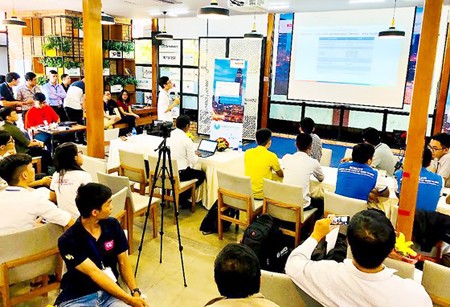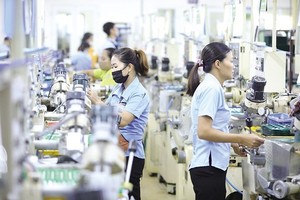
Diverse supporting forms
Statistics from the Saigon Hi-tech Park Incubation Center (SHTP-IC) show that since 2014, the center has incubated 38 projects, 22 of which have been successfully commercialized and other nine projects excellently graduated. In 2017, the total revenues from incubated projects were VND41.4 billion (around $1.818 million). Some incubated projects from the center like Acis, Gremsy, and Vexere were even exported.
Besides incubating activities to technologically aid businesses, the SHTP-IC help these businesses and projects to register for intellectual property rights, to conduct market research, to perfect their model products, to participate in exhibitions and fairs, or to connect them with investors and capital plans, venture capital funds.
According to Mr. Le Thanh Nguyen, Head of the SHTP-IC, this is a very positive sign of public incubation model for science-technology businesses.
From 2007, the HCMC Department of Science and Technology implemented a pilot program, along with consultation and added technological services, for the incubation of science-technology businesses in three locations of Nong Lam University – HCMC, HCMC University of Technology, and the Saigon Hi-tech Park.
This has been a strong foundation for the birth of many other startup support centers recently to aid specific groups of startups. Many universities in the city have also established startup support centers for their own students. Simultaneously, various private incubation centers have been built such as Software Business Incubator (SBI), FPT Ventures.
Thanks to the diversity in incubation centers, startups can easily find support, investment, or partners when needed so that they can proceed with their projects smoothly.
Toward innovative startups
To foster startup activities, the municipal authorities have introduced many policies such as the ‘Program to help small-and-medium-sized businesses to innovate and increase competitive ability for the globalization from 2016-2020’, the ‘Plan to implement Resolution No.35/NQ-CP on supporting business development until 2020’.
When being applied, all these policies greatly boost startup communities, bringing very positive results.
However, reports from the HCMC Department of Science and Technology also indicated that most startups in the city are small-scaled and cannot make impressive breakthrough. They, therefore, need special help from the government as well as participation in public-private cooperation models while attracting contribution from various parts of the innovative ecosystem.
Due to the specific feature and policies of public incubation centers, they are not lucrative enough to attract investors. On the contrary, private incubators gain very optimistic results as the rate of graduated businesses here is over 60 percent, higher that in public ones.
In the long-term, it seems that the model of public-private cooperation might be the ideal one for HCMC. Another professional suggestion is that the city should focus on encouraging innovative startup activities among young people, students, and even pupils since they have great potential.
Director of the HCMC Department of Science and Technology Nguyen Viet Dung said that helping individuals and businesses to do research and to innovate their operation meant improving the living standards of citizens, which in turn can contribute to the economic development.
HCMC has set up a goal to support 2,000 projects of innovative business until 2020 by helping to create an innovative working environment for startups via public-private cooperation, by forming a connection of information via database building for laboratories among national scientific organizations, by developing regulations to increase the effectiveness when using the infrastructure of science-technology organizations with governmental investment, by creating and fostering targeted programs regarding major fields such as smart city, integrated circuit, or stem cells.
























